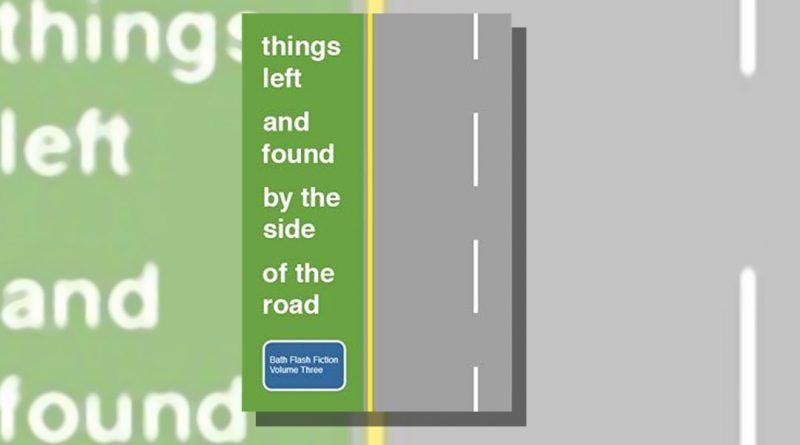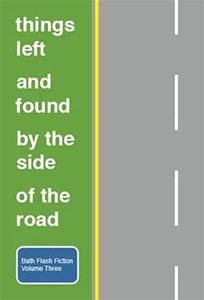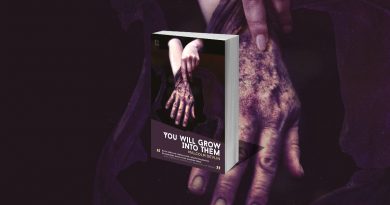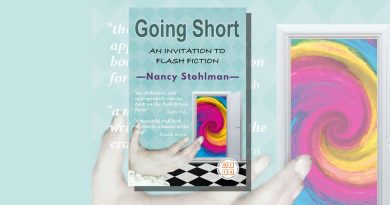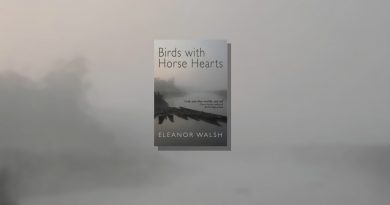Things Left and Found by the Side of the Road — Bath Flash Fiction Volume Three
-Reviewed by Rhys Knapman-
Things Left and Found by the Side of the Road (Ad Hoc Fiction) is an anthology of 133 ‘short short fictions’ — 300 words and under — that were all short listed, long listed or winners of the 2018 international Bath Flash Fiction Awards. The collection contains works from authors from 45 different countries around the world.
The first ‘short short fiction’ in the collection is the eponymous ‘Things Left and Found by the Side of the Road’ by Jo Gatford. Taking the form of a list, Gatford describes things that literally — ‘Baby seats, sometimes with babies in them, swiftly recovered’ — and metaphorically — ‘The shouts of children : Cows! Red car! Lion! Lion? No. Cows!’ — have been lost or recovered at Tarmac verges. At the same time, it tells the story of the immediate aftermath of a car crash.
Despite the lack of characters, the meeting of human and animal debris creates a realistic setting for a tragic story.
‘Shadow Broth’ by Ingrid Jendrzejewski has a similar premise to the above: a darker story told using a list like form. However, while ‘Things Left and Found by the Side of the Road’ was purely a list, this short fiction takes the joint form of a recipe, with each point an instruction rather than an item and a stream of consciousness monologue. As a result of the chosen form, the story — a bitter narrator discussing the loneliness and poverty they are experiencing — is told in overt cooking metaphors that are then extended out to give more details.
“When the oven fails to ignite, when the click-click-woosh of the hob is more of a tick-tick-tick-tick-tick-tick-tick, when the gas man won’t answer the phone and you’re all alone with the lights off too, that’s when you can really get cooking.”
The ingredients and instructions give a fantastic insight into the narrator’s mind. The blended recipe/stream of consciousness form provides the piece with a breathless feel, giving a sense of the world bearing down on the character.
Each short fiction evokes feelings in 300 words — or fewer — that authors of longer works might take chapters or even whole books trying to achieve.
Linda Grierson Irish’s ‘Tupperware Genie’, for example, tells almost the whole story of a absent father and the effect it has on those left behind. The reader is invited to interpret and deduce the full story based upon what is and is not said.
“Yes, he was smart, in his own way. Yes, he was funny, after a fashion.”
‘My Grandmother Is Drinking Earl Grey’ by Kapka Nilan is one of very few science fiction stories within the anthology. The narrator uses a ‘virtual reality called WEIRD’ to communicate with a long dead relative, their grandmother. Though the conversation they have is short — three lines of dialogue each — the world of the fiction becomes fleshed out and fully immersive.
The believability of the world is enhanced by real and familiar situations: the virtual reality device was ‘bought from eBay’, for example, and the battery running out of power is a major drive of the plot and the emotion.
“Life is a drop of water, I want to tell her, unless you miss someone.”
Ultimately, however, the piece uses technology as a vehicle to tell a story about the importance of people and family.
‘The Four Seasons’ by Rosamund Davies uses an airport to tell its story of all travellers, before narrowing itself down to focus on a single man.
From the first line: ‘It is winter in the airport, or at least it is for some travellers’, the setting’s unique situation is explored. People are dressed for all weathers, making it impossible to know what season it actually is.
“The staff who wear uniforms wear the same uniforms in winter and summer, spring and autumn.”
Meanwhile, a man sits and worries whether his bulb will be collected by customs or not. His concerns and thoughts make up the bulk of the piece.
Both he and his location remain nameless throughout the piece, these details are less important than his hopes that his plant will ‘bring its own season with it’. As a metaphor for homesickness, or for the desire to have a link to family, even on the other side of the world, the bulb works incredibly well.
Throughout the anthology every word has been chosen with care (these were all, at the very least, long-listed for the Bath Flash Fiction Award, after all). Every story is packed with detail, far more than might be assumed possible in so few words. Each author sets the scene, develops emotion and tells a compelling story — often with equally rich historical, cultural or social context — making their fictions memorable and deserving of multiple readings.

